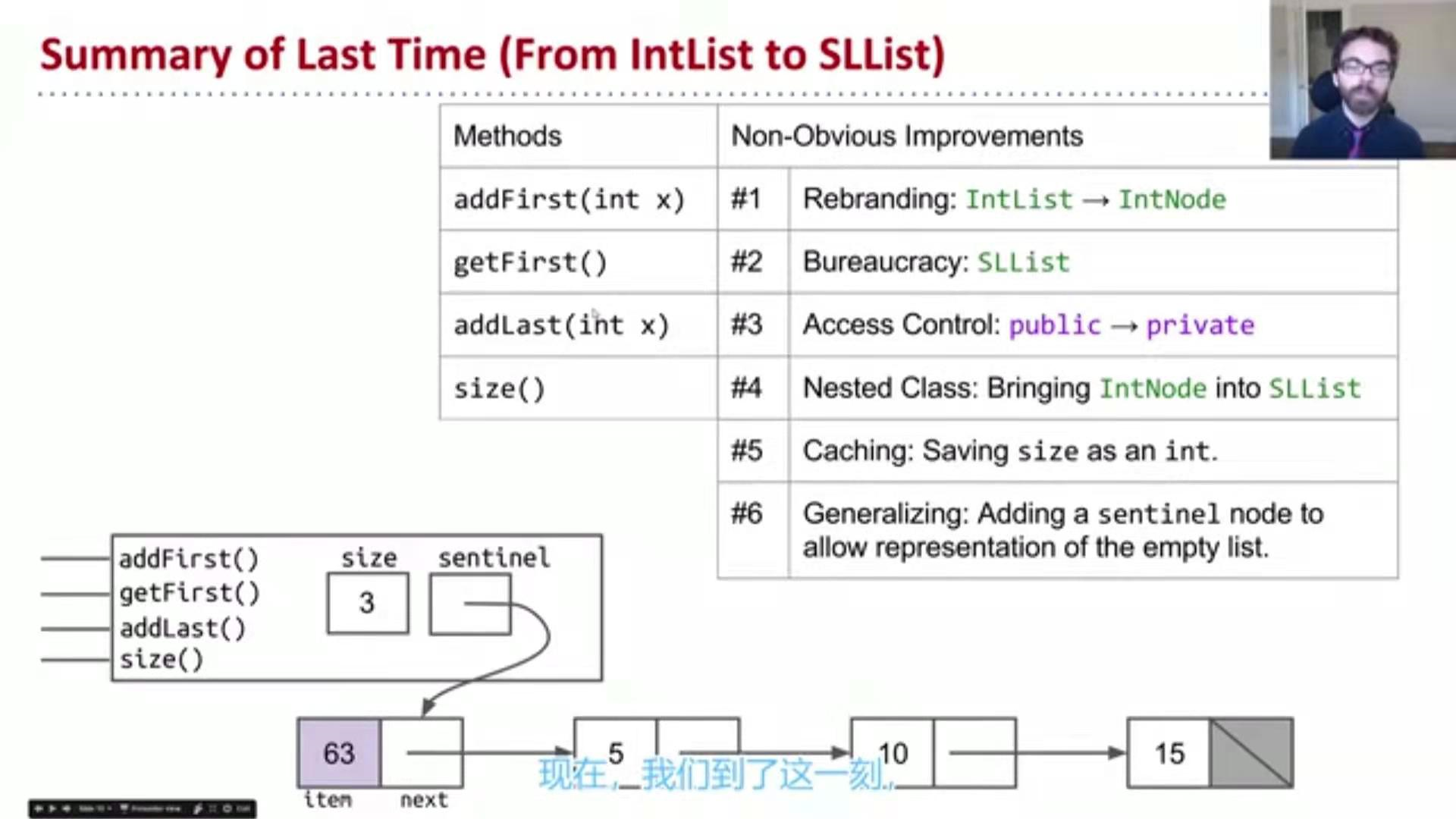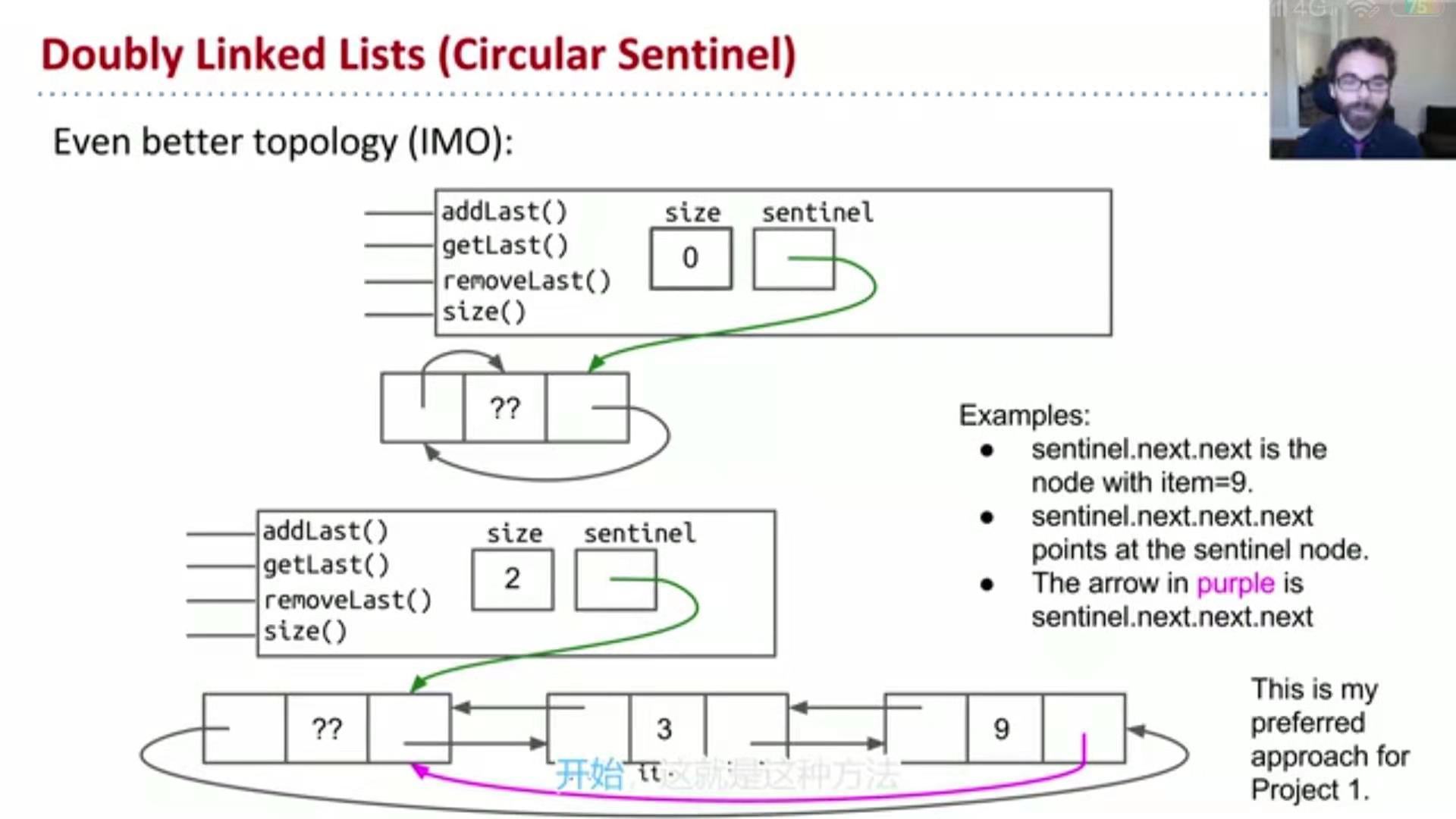# 链表
# 1 slist
# 1 IntList
public class IntList {
public int first;
public IntList rest;
public IntList(int f, IntList r) {
first = f;
rest = r;
}
/** Return the size of the list using... recursion! */
public int size() {
if (rest == null) {
return 1;
}
return 1 + this.rest.size();
}
/** Return the size of the list using no recursion! */
public int iterativeSize() {
IntList p = this;
int totalSize = 0;
while (p != null) {
totalSize += 1;
p = p.rest;
}
return totalSize;
}
/** Returns the ith item of this IntList. */
public int get(int i) {
if (i == 0) {
return first;
}
return rest.get(i - 1);
}
public static void main(String[] args) {
IntList L = new IntList(15, null);
L = new IntList(10, L);
L = new IntList(5, L);
System.out.println(L.get(100));
}
}
# 2 SList


- 解决了什么问题
- intList -> IntNode
- Bureaucracy: SLList
- Access control: public ->> private
- Nested class: Bring IntNode to SLList
- Ceching: saving size as an int
- Generalizing: Adding a senitial node to allow represetation of the empty list
public class SLList {
private static class IntNode {
public int item;
public IntNode next;
public IntNode(int i, IntNode n) {
item = i;
next = n;
System.out.println(size);
}
}
/* The first item (if it exists) is at sentinel.next. */
private IntNode sentinel;
private int size;
private static void lectureQuestion() {
SLList L = new SLList();
IntNode n = IntNode(5, null);
}
/** Creates an empty SLList. */
public SLList() {
sentinel = new IntNode(63, null);
size = 0;
}
public SLList(int x) {
sentinel = new IntNode(63, null);
sentinel.next = new IntNode(x, null);
size = 1;
}
/** Adds x to the front of the list. */
public void addFirst(int x) {
sentinel.next = new IntNode(x, sentinel.next);
size = size + 1;
}
/** Returns the first item in the list. */
public int getFirst() {
return sentinel.next.item;
}
/** Adds x to the end of the list. */
public void addLast(int x) {
size = size + 1;
IntNode p = sentinel;
/* Advance p to the end of the list. */
while (p.next != null) {
p = p.next;
}
p.next = new IntNode(x, null);
}
/** Returns the size of the list. */
public int size() {
return size;
}
public static void main(String[] args) {
/* Creates a list of one integer, namely 10 */
SLList L = new SLList();
L.addLast(20);
System.out.println(L.size());
}
}
# 3 泛型SSList
public class SLList<LochNess> {
private class StuffNode {
public LochNess item;
public StuffNode next;
public StuffNode(LochNess i, StuffNode n) {
item = i;
next = n;
}
}
private StuffNode first;
private int size;
public SLList(LochNess x) {
first = new StuffNode(x, null);
size = 1;
}
/** Adds x to the front of the list. */
public void addFirst(LochNess x) {
first = new StuffNode(x, first);
size += 1;
}
/** Returns the first item in the list. */
public LochNess getFirst() {
return first.item;
}
/** Adds an item to the end of the list. */
public void addLast(LochNess x) {
size += 1;
StuffNode p = first;
/* Move p until it reaches the end of the list. */
while (p.next != null) {
p = p.next;
}
p.next = new StuffNode(x, null);
}
public int size() {
return size;
}
}
#
# 4 DLList


public class DLList{
private static class IntNode {
public int item;
public IntNode next;
public IntNode pre;
public IntNode(int i, IntNode n, IntNode P) {
item = i;
next = n;
pre = p;
System.out.println(size);
}
}
private IntNode sentinel;
private int size;
public static void letrueQuestion(){
SLList L = new SLList();
IntNode n= IntNode(5, null,null);
}
public SLList(){
sentinel = new IntNode(63, null, null);
size = 0;
}
// 一个猜想, 还没验证
public SLList(int x){
sentinel = new IntNode(63, null, null);
sentinel.next = new IntNode(x, sentinel, sentinel);
sentinel.pre = new IntNode(x, sentinel, sentinel);
size =1;
}
public void addFirst(int x){
IntNode second = sentinel.next;
sentinel.next = new IntNode(x, sentinel.next, sentinel);
second.pre = new IntNode(x, sentinel.next, sentinel);
size= size+1;
}
public void addLast(int x){
IntNode Last = sentinel.pre;
sentinel.pre = new IntNode(x, sentinel, sentinel.pre);
Last.next = new IntNode(x, sentinel, sentinel.pre);
size= size+1;
}
public int getFirst(){
return sentinel.next.item;
}
public int getFirst(){
return sentinel.pre.item;
}
public int size(){
return size;
}
public static void main(String[] args){
SLList L = new SLList();
L.addLast(20);
System.out.println(L.size());
}
}
# 5 AList
public class AList {
private int[] items;
private int size;
/** Creates an empty list. */
public AList() {
items = new int[100];
size = 0;
}
/** Resizes the underlying array to the target capacity. */
private void resize(int capacity) {
int[] a = new int[capacity];
System.arraycopy(items, 0, a, 0, size);
items = a;
}
/** Inserts X into the back of the list. */
public void addLast(int x) {
if (size == items.length) {
resize(size + 100);
}
items[size] = x;
size = size + 1;
}
/** Returns the item from the back of the list. */
public int getLast() {
return items[size - 1];
}
/** Gets the ith item in the list (0 is the front). */
public int get(int i) {
return items[i];
}
/** Returns the number of items in the list. */
public int size() {
return size;
}
/** Deletes item from back of the list and
* returns deleted item. */
public int removeLast() {
int x = getLast();
size = size - 1;
return x;
}
}
# 6 SLList vs Alist
- size 为 n
| SLList | AList | |
|---|---|---|
| 插入与删除 | o(1) | o(n) |
| 查找 | o(n) | o(1) |